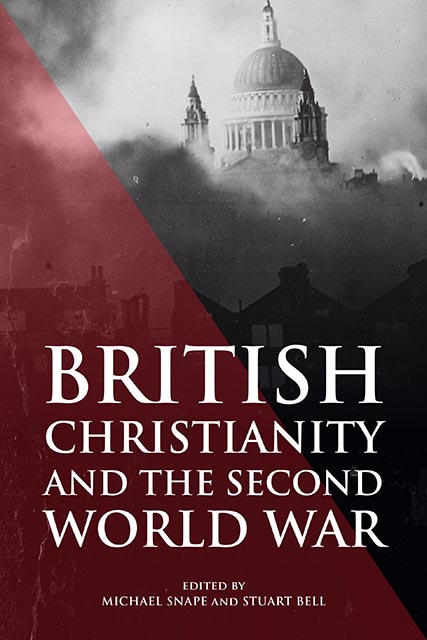37 results
Predictors of primary care psychological therapy outcomes for depression and anxiety in people living with dementia: evidence from national healthcare records in England
-
- Journal:
- The British Journal of Psychiatry / Volume 224 / Issue 6 / June 2024
- Published online by Cambridge University Press:
- 08 February 2024, pp. 205-212
- Print publication:
- June 2024
-
- Article
-
- You have access
- Open access
- HTML
- Export citation
Maternal incarceration increases the risk of self-harm but not suicide: a matched cohort study
- Part of
-
- Journal:
- Epidemiology and Psychiatric Sciences / Volume 32 / 2023
- Published online by Cambridge University Press:
- 10 May 2023, e33
-
- Article
-
- You have access
- Open access
- HTML
- Export citation
Contributors
-
- Book:
- British Christianity and the Second World War
- Published by:
- Boydell & Brewer
- Published online:
- 21 June 2023
- Print publication:
- 21 February 2023, pp ix-x
-
- Chapter
- Export citation
Note on Footnotes
-
- Book:
- British Christianity and the Second World War
- Published by:
- Boydell & Brewer
- Published online:
- 21 June 2023
- Print publication:
- 21 February 2023, pp xii-xii
-
- Chapter
- Export citation
Frontmatter
-
- Book:
- British Christianity and the Second World War
- Published by:
- Boydell & Brewer
- Published online:
- 21 June 2023
- Print publication:
- 21 February 2023, pp i-iv
-
- Chapter
- Export citation
8 - Principled or Pragmatic? English Nonconformist Opposition to Pacifism in the Inter-War Period
-
-
- Book:
- British Christianity and the Second World War
- Published by:
- Boydell & Brewer
- Published online:
- 21 June 2023
- Print publication:
- 21 February 2023, pp 133-149
-
- Chapter
- Export citation
Contents
-
- Book:
- British Christianity and the Second World War
- Published by:
- Boydell & Brewer
- Published online:
- 21 June 2023
- Print publication:
- 21 February 2023, pp vii-viii
-
- Chapter
- Export citation
Studies in Modern British Religious History
-
- Book:
- British Christianity and the Second World War
- Published by:
- Boydell & Brewer
- Published online:
- 21 June 2023
- Print publication:
- 21 February 2023, pp 225-227
-
- Chapter
- Export citation
Index
-
- Book:
- British Christianity and the Second World War
- Published by:
- Boydell & Brewer
- Published online:
- 21 June 2023
- Print publication:
- 21 February 2023, pp 215-224
-
- Chapter
- Export citation

British Christianity and the Second World War
-
- Published by:
- Boydell & Brewer
- Published online:
- 21 June 2023
- Print publication:
- 21 February 2023
4 - Getting the Message Out: Publishing ‘British Christianity’ 1939–43
-
-
- Book:
- British Christianity and the Second World War
- Published by:
- Boydell & Brewer
- Published online:
- 21 June 2023
- Print publication:
- 21 February 2023, pp 66-81
-
- Chapter
- Export citation
Abbreviations
-
- Book:
- British Christianity and the Second World War
- Published by:
- Boydell & Brewer
- Published online:
- 21 June 2023
- Print publication:
- 21 February 2023, pp xiii-xiv
-
- Chapter
- Export citation
Dedication
-
- Book:
- British Christianity and the Second World War
- Published by:
- Boydell & Brewer
- Published online:
- 21 June 2023
- Print publication:
- 21 February 2023, pp v-vi
-
- Chapter
- Export citation
Acknowledgements
-
- Book:
- British Christianity and the Second World War
- Published by:
- Boydell & Brewer
- Published online:
- 21 June 2023
- Print publication:
- 21 February 2023, pp xi-xi
-
- Chapter
- Export citation
The ASKAP Variables and Slow Transients (VAST) Pilot Survey
- Part of
-
- Journal:
- Publications of the Astronomical Society of Australia / Volume 38 / 2021
- Published online by Cambridge University Press:
- 12 October 2021, e054
-
- Article
-
- You have access
- HTML
- Export citation
John Wolffe. Sacred and Secular Martyrdom in Britain and Ireland since 1914. London: Bloomsbury Academic, 2019. Pp. 208. $115.00 (cloth).
-
- Journal:
- Journal of British Studies / Volume 59 / Issue 4 / October 2020
- Published online by Cambridge University Press:
- 07 October 2020, pp. 969-970
- Print publication:
- October 2020
-
- Article
- Export citation
The GLEAM 4-Jy (G4Jy) Sample: I. Definition and the catalogue
- Part of
-
- Journal:
- Publications of the Astronomical Society of Australia / Volume 37 / 2020
- Published online by Cambridge University Press:
- 01 June 2020, e018
-
- Article
-
- You have access
- HTML
- Export citation
The GLEAM 4-Jy (G4Jy) Sample: II. Host galaxy identification for individual sources
- Part of
-
- Journal:
- Publications of the Astronomical Society of Australia / Volume 37 / 2020
- Published online by Cambridge University Press:
- 01 June 2020, e017
-
- Article
-
- You have access
- HTML
- Export citation
Turbulent jets with off-source heating
-
- Journal:
- Journal of Fluid Mechanics / Volume 824 / 10 August 2017
- Published online by Cambridge University Press:
- 11 July 2017, pp. 766-784
-
- Article
- Export citation
Part II - Changes and conflicts
-
- Book:
- Management for Psychiatrists
- Published online:
- 02 January 2018
- Print publication:
- 23 September 2016, pp 139-140
-
- Chapter
- Export citation

























